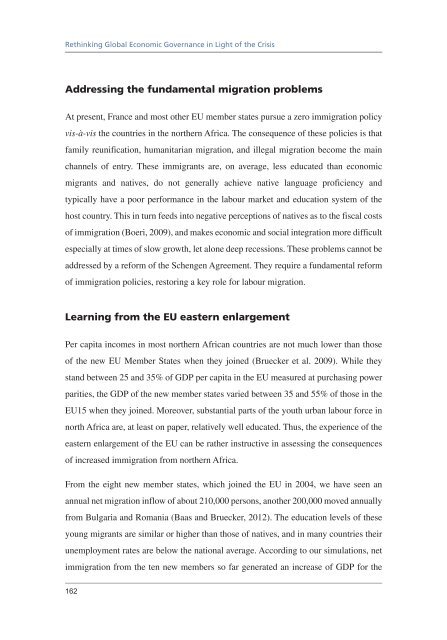Download PDF - Vox
Download PDF - Vox
Download PDF - Vox
- No tags were found...
You also want an ePaper? Increase the reach of your titles
YUMPU automatically turns print PDFs into web optimized ePapers that Google loves.
Rethinking Global Economic Governance in Light of the CrisisAddressing the fundamental migration problemsAt present, France and most other EU member states pursue a zero immigration policyvis-à-vis the countries in the northern Africa. The consequence of these policies is thatfamily reunification, humanitarian migration, and illegal migration become the mainchannels of entry. These immigrants are, on average, less educated than economicmigrants and natives, do not generally achieve native language proficiency andtypically have a poor performance in the labour market and education system of thehost country. This in turn feeds into negative perceptions of natives as to the fiscal costsof immigration (Boeri, 2009), and makes economic and social integration more difficultespecially at times of slow growth, let alone deep recessions. These problems cannot beaddressed by a reform of the Schengen Agreement. They require a fundamental reformof immigration policies, restoring a key role for labour migration.Learning from the EU eastern enlargementPer capita incomes in most northern African countries are not much lower than thoseof the new EU Member States when they joined (Bruecker et al. 2009). While theystand between 25 and 35% of GDP per capita in the EU measured at purchasing powerparities, the GDP of the new member states varied between 35 and 55% of those in theEU15 when they joined. Moreover, substantial parts of the youth urban labour force innorth Africa are, at least on paper, relatively well educated. Thus, the experience of theeastern enlargement of the EU can be rather instructive in assessing the consequencesof increased immigration from northern Africa.From the eight new member states, which joined the EU in 2004, we have seen anannual net migration inflow of about 210,000 persons, another 200,000 moved annuallyfrom Bulgaria and Romania (Baas and Bruecker, 2012). The education levels of theseyoung migrants are similar or higher than those of natives, and in many countries theirunemployment rates are below the national average. According to our simulations, netimmigration from the ten new members so far generated an increase of GDP for the162














